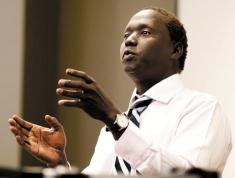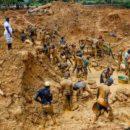Ethiopia: Abiy Ahmed’s two options after the election

The Prime Minister’s party is likely to consolidate power in today’s elections. How he will use this power is less clear.

Prime Minister Abiy Ahmed’s international reputation has plummeted since he won the Nobel Peace Prize. Credit: Bair175.
Barely three years ago, the little-known Abiy Ahmed burst onto Ethiopia’s political scene at the height of another tumultuous period in the country’s history. The new prime minister quickly won national admiration and international attention. He was a fresh breath of air. He spoke differently and acted differently.
Abiy also brought calm to a nation on the edge. Unity, harmony, love and forgiveness became the hallmark of his political narrative. This helped the PM, who recently turned 44, amass support across the nation as never seen before on Ethiopia’s political scene. His international standing also soared after he mended relations with Eritrea for which he won the Nobel Peace Prize.
A lot has changed since then. Instances of communal violence, some of them bordering on ethnic cleansing, have taken place. High profile political assassinations have stunned the nation time and again. Internal displacements have become common.
Worse still, the disputed regional election in Tigray has led to the current war with the Tigrayan People’s Liberation Front (TPLF), now rebranding itself as the Tigrayan Defence Force. The conflict has dented the Prime Minister’s reputation domestically as well as internationally.
In the meantime, Ethiopia holds a general election today, on 21 June, in one of the most precarious times in the nation’s history. Will it bring any meaningful change?
Same problem, same wrong remedies
The crux of the challenge facing Abiy is not of his own making. The problem of ethnic diversity and the question of a fair share of power and resources is as old as medieval Ethiopia.
It’s a challenge that’s prompted a series of wrong remedies over the decades, or even centuries. The old political paradigm – from Solomonic dynasty to Mengistu Hailemariam’s Marxist regime – opted for blanket unionism. They did not sufficiently articulate the grievances of those who felt they were in the margins and provide solution based on dialogue.
The regime that followed – the TPLF-led ethno-federalist Ethiopian People’s Revolutionary Democratic Front (EPRDF) – went to the opposite extreme. It granted the right for self-governing including the right to cessation to those they described as “nations, nationalities and people groups”. Instead of solving the problem, this arrangement became a breeding ground for conflict entrepreneurs.
Despite their clear differences, the same principle operated behind both these approaches: ethnic domination.
Abiy came to power in a time when some pockets of the society were deeply disenchanted with the ethno-nationalist system. Others, however, were demanding even more enhanced federal states in which ethnic communities form political parties which bear their names and promote their interests.
Abiy, however, has remained an enigma. At times, he personified rhetorical unionism. At others, he espoused practical ethno-federalism. While the TPLF and other ethno-nationalist groups feel that Abiy is going to undo the system they put in place in the last three decades, the unionist groups are uneasy that he is not moving fast enough to dismantle the ethno-federalist system. This provided other dynamics underlying the conflict in Tigray.
Winning this election could give Abiy a popular mandate to clearly define his position on the thorny issue.
The politics of elimination
Ethiopia has long struggled to embrace the idea of winning through dialogue and moderation. Political competitors perceive each other as archenemies. The typical tactic for winning politically has been through eliminating competitors. Dialogue and compromise remain alien concepts.
The war in Tigray is emblematic of this culture. It’s mainly fuelled by undue notions of heroism rather than cool headed political manoeuvring. The TPLF could not accept the loss of power and privilege when Abiy came to power, leading to mutual suspicion and enmity. In this scenario, ordinary people bear the brunt of war, including unlawful killings, rape and now starvation.
The credibility of this election is already dented by the fact that some opposition members have either withdrawn or been jailed. Prominent examples include Jawar Mohammed of Oromo Federalist Congress and Eskinder Nega of Baldaras for True Democracy.
It is hard to imagine any election taking place in Tigray because of the ongoing conflict.
What after the election?
It is very likely that the prime minister’s Prosperity Party will win this election. This is partly because most Ethiopians might think a dramatic change of leadership at this time would be risky. Another factor is that there is no political opposition that can mount a meaningful challenge.
Some have suggested that Abiy has made sure the opposition is weak. The reality, however, is that the cultural division applies to intra-party politics too. The Oromo elites, for example, are deeply divided. There is a crippling division within the Oromo Liberation Front, one of the oldest parties to stand for the cause of Oromo people.
If Abiy wins, there are two possible trajectories that he could follow. The first is that he begins nation-building.
If he takes the first route, he would do well to listen more and – contrary to his preferred style – lecture less. This listening and dialoguing process needs to start with his own constituency – Oromia – and extend to war-torn Tigray. With a renewed mandate, Abiy could worry less about the optics of delivering big signature projects and striking unexpected peace deals with neighbours, as important as these are. Instead, he could begin addressing the roots of fear, mistrust and violence that is threatening to tear apart the social fabric of the nation.
The second, less desirable, possibility is that he could take a more authoritarian course. If he chooses this approach, there will be no shortage of pretexts to make his actions seem necessary. Abiy can project himself as the leader of law and order. There is already widespread lawlessness and the loss of a sense of security among the masses. Ethiopia is at a stage where he could make the argument that democracy is simply too much of a luxury.
This article is republished from The Conversation under a Creative Commons license. Read the original article.![]()






